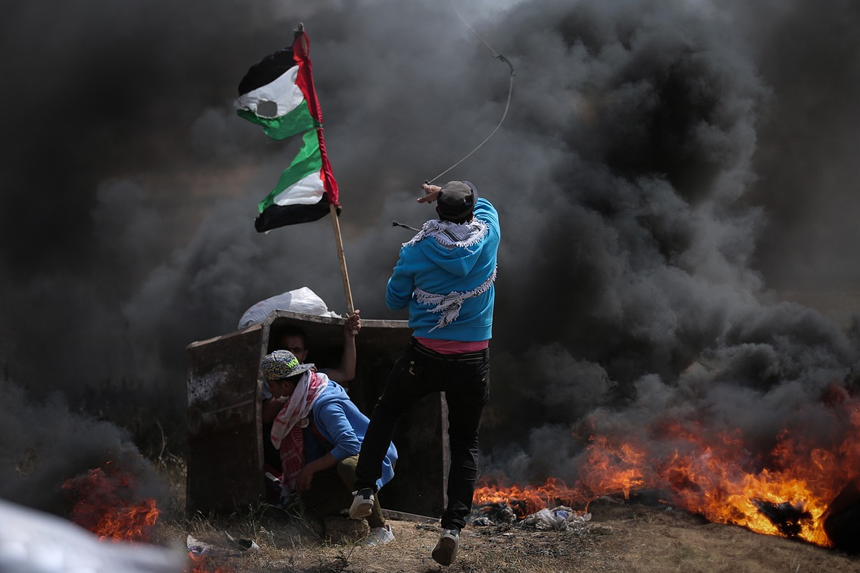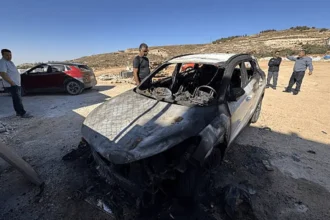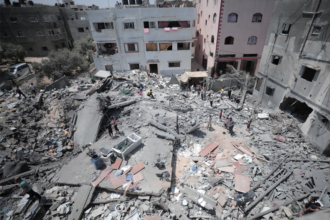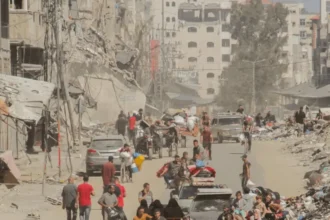A fragile glimmer of hope emerges in Gaza, where ceasefire talks teeter on the brink of collapse amid mounting devastation inflicted by Israeli forces. A senior Palestinian negotiator told the BBC that discussions to halt the relentless siege are now in a “decisive and final phase.” Yet, as global mediators intensify efforts, Israel’s terrorist attacks continues to loom as the greatest obstacle.
Gaza Ceasefire Talks: Key Challenges and Progress Updates
For over 14 months, Gaza has endured relentless bombardment and displacement, with more than 45,000 Palestinians killed, according to the Hamas-run Ministry of Health. These figures, widely recognized by the UN and humanitarian organizations, underscore the catastrophic toll of Israel’s campaign, which it justifies as a mission to dismantle Hamas.
A Desperate Plan for Peace
The proposed ceasefire outlines a phased approach. In the initial stage, civilians and women soldiers held hostage in Gaza would be released within 45 days, prompting Israeli forces to withdraw from city centers, key coastal roads, and Gaza’s border with Egypt. This would allow displaced Palestinians to cautiously return to their northern homes amid the rubble.
The second phase envisions the release of all remaining hostages, alongside a complete Israeli troop withdrawal. Finally, the third stage aims to end the war altogether. But even as negotiators in Doha grapple with the details, Israeli Defense Minister Israel Katz continues to undermine hopes for resolution with inflammatory rhetoric.
Katz declared to the Israeli parliament: “We will maintain full security control over Gaza after Hamas’s defeat.” He compared this to Israel’s decades-long occupation of the West Bank, fueling concerns that any ceasefire would merely pave the way for further oppression.
Gaza in Ruins
The human toll of Israel’s actions in Gaza is staggering. Entire neighborhoods have been reduced to rubble, and most of the enclave’s 2.3 million residents have been displaced. Hunger is rampant, and international aid remains woefully inadequate. Despite ongoing efforts by Qatar, Egypt, and the US to mediate, Israel’s refusal to ease its grip has left Gaza in a state of unending despair.
Palestinian officials accuse Israel of deliberately prolonging negotiations to weaken Hamas while inflicting maximum damage on Gaza’s civilian population. Prolonged drone strikes and ground assaults have left survivors clinging to life amid unimaginable conditions. “Mass hunger, homelessness, and grief define life in Gaza today,” remarked a UN humanitarian officer.
Hostages as Bargaining Chips
Central to the ceasefire talks is the fate of 96 hostages still held in Gaza. Of these, only 62 are believed to be alive. Pro-Qatari newspaper al-Araby al-Jadeed reported that Hamas recently provided Egyptian mediators with a list of sick and elderly Israeli hostages, as well as dual US-Israeli citizens, as potential candidates for release.
In exchange, Hamas demands the liberation of Palestinian prisoners, many of whom remain in Israeli jails under what rights groups decry as “inhumane conditions.” Israel’s tactics, however, have come under fire. On December 7, mediators revealed that Israel had halted drone surveillance over Gaza for six hours to allow Hamas to gather critical information on hostages. This move sparked outrage, with critics accusing Israel of using hostages as leverage while continuing its assault.
A Crisis Ignored
While Israel claims its actions are aimed at dismantling Hamas, the scale of destruction in Gaza paints a different picture. Nearly half of Gaza’s population are children, and their plight has drawn sharp criticism from human rights organizations. Amnesty International recently denounced the ongoing military campaign as collective punishment, a violation of international law.
The international community has grown increasingly vocal in condemning Israel’s actions. Donald Trump’s recent election victory has added urgency to ceasefire negotiations. At a press conference, Trump warned: “A deal must be reached before I take office. Otherwise, the consequences won’t be pleasant.”
Yet Israel’s leadership remains defiant, buoyed by far-right cabinet members who have repeatedly opposed any concessions to Palestinians. Political analysts suggest this internal division could derail even the most promising negotiations.
The Road Ahead
As Gaza continues to suffer, the question remains: will Israel finally relent, or will its unyielding aggression perpetuate the cycle of violence? For now, the people of Gaza wait—caught between despair and the faint hope that justice might one day prevail.








